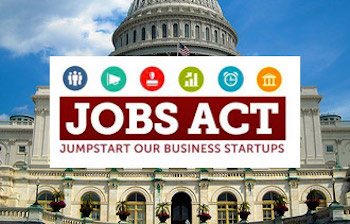This post was written by Pete Hoegler, Washington DC-based Social Media Savant for The JLC Group.
Three years after the JOBS Act was passed, it seems that Washington is back for more–a curtain call if you will–making it easier for small ventures to raise capital.
The House Financial Services Committee in early June floated a draft bill that would allow the creation of “venture exchanges” tailored to the needs of small companies looking to raise money. In many ways, the success of the JOBS Act hinges upon the creation of such markets. A healthy secondary market created liquidity that is critical to building investor confidence and creating a robust alternative to the global markets that today are dominated by enormous corporations.
The new proposed “venture exchange” laws are aimed at increasing access to early stage investors in private startups and small businesses (some of which could be JOBS Act enabled investors), as a lack of liquidity was a concern voiced by some surrounding the new laws for equity crowdfunding with non-accredited investors.
Investors in technology startups, for example, are likely to have to hold their position in any one investment for an average of 7 years. Creating opportunities for selling private stock in a start-up investment sooner through venture exchanges has the potential to reduce some of the early stage investment risks.
Where or How is there a link between Crowdfunding and Exchange-Traded Funds? Well, those following the creative finance wizards from the world of exchange-traded products can speculate the next innovation will be ETFs comprised of non-public companies that were funded via crowdfunding platforms..and those companies will be labeled “pre-emerging start-ups” and there will be ETFs for each category of ‘project.’
While the underlying components might not necessarily be easily-traded by the universe of market-makers who profit by arbitraging the cash index vs. the underlying constituents, the advent of ETMFs, a structure that Eaton Vance hopes to bring to market and is based on a “non-transparent” construct (meaning the investor has no idea what the underlying constituents are), Crowdfunding ETFs could create markets that allow early investors who invested via equity crowdfunding to hedge their bets far before any kind of liquidity event like a public offering (IPO) might take place, spelling an opportunity for liquidity for those early investors. Just like the current ETF landscape, these crowd-funding indexes would be themed according to industry sector and/or product categories.
OK, some of the wonks who are reading that last tongue-in-cheek idea might be rolling their eyes. That said, given the creative juices that flow from the capital markets, we’re willing to bet that at least one of the current innovators in the ETF world grabs on to this idea and such products will be introduced within the next 18-24 months. Oh, it was our idea…
The number of IPOs has gone from an average of 311 from 1980-2000 down to an average of 99 IPOs each year from 2001-2011 so opening up other alternatives for liquidity will de-risk the growing number of startup investments happening online.
This is yet another step towards reforming our capital markets. The first step was to enable access, and was addressed by Titles II, III & IV of the JOBS Act. So regardless of your opinion on this matter, the summer is shaping up to be an interesting time for equity crowdfunding investors, accredited and non-accredited alike.

